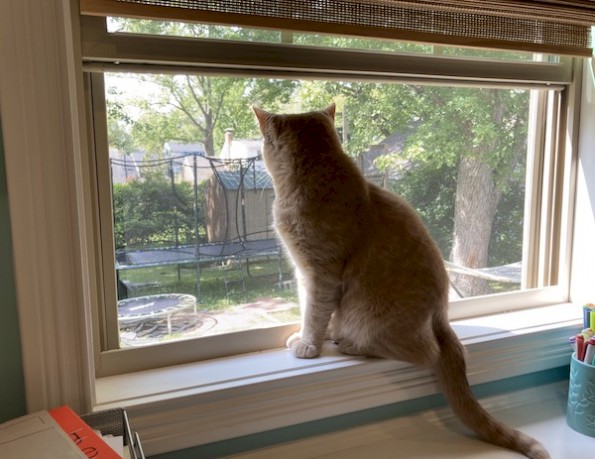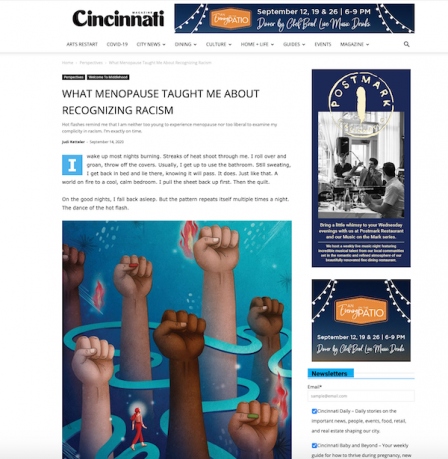My cat and my town are both named Madeira, and right now, they are both having some problems. My Cincinnati suburb of 9,000 and my honey-colored tabby are each acting out because they are uncomfortable with change.

The cat is pretty straightforward. With the kids back in school after all this time, she’s confused about where they are. She’s not unhappy about it. She is just perplexed by it. After all, for almost six months, they were here and hardly anywhere else. Plus, the house was much sleepier. Now, we’re all up and about at the ungodly hour of 7 a.m. and she doesn’t know what to make of it. Her answer is to follow me around and pee in the dirty laundry. She has mostly stopped doing the peeing thing, so I think we’re through the awkward transition.
If only it were that easy with my town—a comfortable, middle-class community full of mostly white people. A sizeable chunk of those white people look around and think that because what they are seeing is so nice, it’s evidence that there is no racism here. Or that if there is racism, it’s not their problem.
Some of these people are lashing out at those of us who are trying to have conversations about race. Apparently, doing the very American thing of pointing out racial injustice, listening to the people who experience it, and working towards change makes you a . . . socialist? It’s all very maddening, but at least we (mostly) won the contentious fight to finally get the Thin Blue Line flag decal removed from our police cruisers.
I no longer find the lashing out of white people surprising. Black people and other people of color would certainly not be surprised because they’ve been experiencing white rage and white violence for years.
I’ve learned that my “This is so shocking!” reactions only show my own stupidity about racism, and I want to be less stupid. So I’ve stopped adding my voice to the chorus of the well-meaning. I want to say better things instead. I want to be held accountable, versus just being indignant, which doesn’t require you to change your behavior at all.
So on that note, I want to share two pieces I wrote recently—one for Cincinnati magazine and one for Scientific American. They are very different, but also, kind of about the same thing.
The Cincinnati magazine piece, called “What Menopause Taught Me About Recognizing Racism,” is my September column. It’s about my hot flashes and my reckoning with my own racism. Along the way, I talk a bit about what is happening in my little town, and what happened on a popular local Facebook forum when someone tried to have a conversation about race.
The Scientific American piece, called “We Need to do More Research on Honesty” is about . . . um . . . why we need to do more research on honesty.
We know a lot about why people lie. We know less about why people are honest and why they speak out. In writing my book about honesty, Would I Lie to You? The Amazing Power of Being Honest in a World That Lies (which published earlier this year), I started to understand that “not lying” isn’t the same as being honest. As it turns out, there is a $4.4 million research grant around that very idea, and in writing this piece, I got the chance to talk to one of the philosophers and one of the researchers behind the project. I’m very excited at what’s ahead in the work on honesty.
Most afternoons, my cat sits in front of the window, observing the world. I’m a keen observer too. I watch more than I speak out. I’m wondering lately what might be different if I spoke out more? If I was less concerned with keeping the peace. If I saw myself as in it, not just an observer of it.
I’m understanding more and more that an honest life isn’t just one where you avoid deception. It’s one where you get into things. You speak up. Even if it makes people pee in the laundry.



